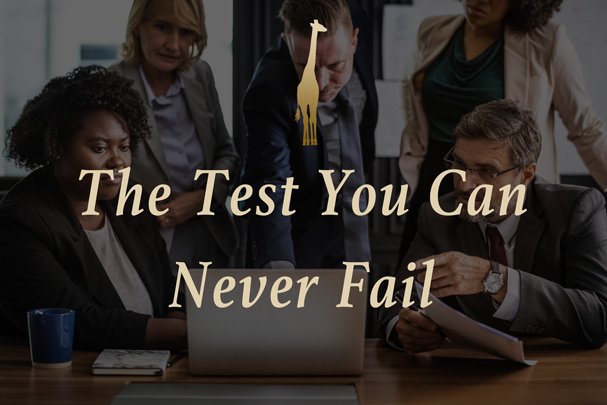The Test You Can Never Fail
Clifton StrengthsFinder
This headline likely spoke to you because most people indicate that they don’t like and aren’t so great at test taking. (No matter how good they actually are at it!)
But what if you could take a test that ensures that there are no wrong answers; something that queries your innate inclinations to reveal the strengths that you most naturally gravitate towards?
In fact, what I reference is not truly a test, but an assessment called Gallup Clifton StrengthsFinder. Its author and creator of the CliftonStrengths, former Gallup chairman Don Clifton (1924-2003), was honored by the American Psychological Association with a Presidential Commendation as the Father of Strengths-Based Psychology.
With more than 20+ million people from 160 countries who have thus far participated, this assessment leverages the foundational research, analytics and management consulting that Gallup was built upon since its inception in 1935.
The strengths movement began when Clifton famously asked, “What would happen if we studied what was right with people versus what’s wrong with people?”
However, that’s not how most of us are typically programmed, especially in the work environment.
We have been trained to focus on our weaknesses and even to point out our colleagues’ and employees’ weaknesses thinking that we’re doing them a favor and that these helpful hints will make them stronger. It’s a very negative, glass half empty philosophy that hinders relationships, even more so with one’s self.
To support this concept, in the Harvard Business Review’s (HBR) recently released article, The Feedback Fallacy, details: “…the research is clear: Telling people what we think of their performance doesn’t help them thrive and excel, and telling people how we think they should improve actually hinders learning.”
The HBR article continues by dispelling theories such that when we “… take our own expertise and what we are sure is our colleagues’ inexpertise as givens; they (the theories) assume that my way is necessarily your way. But as it turns out, in extrapolating from what creates our own performance to what might create performance in others, we overreach.”
It surmises that, “We excel only when people who know us and care about us tell us what they experience and what they feel, and in particular when they see something within us that really works.”
But as anyone who has sat through a one hour meeting with five of their colleagues, there will be five different opinions of what happened in that 60 minute span of time. We all bring our own different talents, experiences, values, perspectives to each and every situation.
But how many times do we walk away from a meeting frustrated from a colleagues’ opinion rather than celebrating their particular perspective because its intent will drive us to go from great to greater?
What I appreciate about leveraging a tool such as Gallup Clifton StrengthsFinder within an organization is that it not only reveals the talents of our colleagues amongst one another; it also uncovers the meaning and gives insight of those talents individually to one’s self.
It’s only when we can witness, claim and truly own our own talents internally that we are able to develop them into stronger muscles unique to us. Do you take your own strengths for granted by thinking that anyone can do what you do? Do you not see how others value you for those talents and how they compliment the team?
Here are a few tips you might consider:
Take the Gallup CliftonStrengths Finder assessment. The easiest, and lowest cost of entry is to purchase the StrengthsFinder 2.0 book by Tom Rath on Amazon. It comes with a code that allows you to take the assessment for your Top 5 in the back. Your results will be immediate, along with a summary of their meaning. The book will provide additional insight specific to your strengths.
If you can, hire a Gallup CliftonStrengths Finder Coach to help you define the meaning of your strengths and how best to leverage them.
If you can’t afford to hire a Coach, then spend some quiet time thinking about your Top 5. Catch yourself and truly appreciate the times when you are using your strengths — we do it more than we think. Gallup tells us that there are Five Clues to a talent revealing itself as a strength:
Yearning – we are naturally drawn to it.
Rapid Learning – we pick it up quickly.
Flow – we automatically know it.
Glimpses of Excellence – we surprise ourselves.
Satisfaction – we are excited to repeat it.
As a trusted colleague which of your strengths that he/she values the most in you. Give them permission to become a Strengths Scout for you (i.e., identify when you are in your strengths zone and compliment you on it.) Do the same for them if they’re interested!
For more information, refer to my Blog Post Double Down on Your Strengths from earlier this year or contact me at dlandry@authentizity.com.
We are celebrating!
This week (April 29 th through May 5 th) is International Coaching Week and is held around the world where nearly 36,000 International Coach Federation (ICF) members in 145 countries will celebrate the power of coaching.
For more information, visit https://icfhoustoncoaches.org/ICW.
As a sidebar, if you’d like to learn more about the Gallup organization and its roots with George Gallup since 1935, then visit: https://www.gallup.com/corporate/178136/george-gallup.aspx

